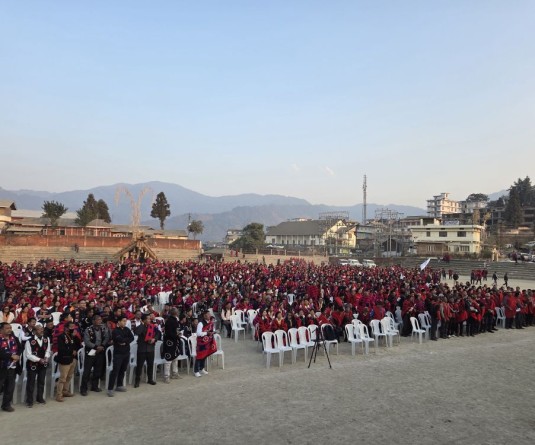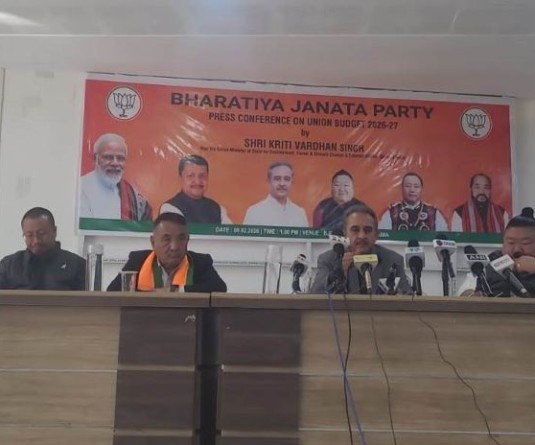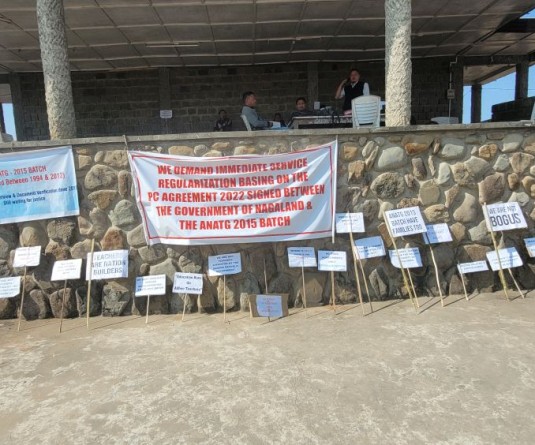(Left) Food stalls at the 10th cultural day of Baptist College Kohima. (Right) Konyak students of Baptist College Kohima performs bamboo dance during 10th cultural day of Baptist College Kohima on April 20. (Morung Photo)

Our Correspondent
Kohima | April 20
The Baptist College Kohima today conducted its 10th cultural day at the college premises. The event was held under the theme ‘Cultural Diversity: finding one’s identity and unity in language, attire and food.’
Rovi Chasie, former food and culture assistant manager, Ashok Group of Hotels and member of the Indian Prime Minister’s Catering team and recipient of award for promoting Naga cuisine by Tenyimia Women Union Dimapur spoke on the topic, ‘Food and culture.’
Food and culture
She said that food is a dominant factor in one's culture. “I have been observing that here in Nagaland, food as part of one's culture is not given the respect and importance it deserves when compared to other factors like music, dance, attire and ornaments, language etc.”
She said “even in our government departments, there is very little space given to food as part of arts and culture, except when our local cuisine is used only as a tool to entertain tourists which in my opinion is very unfortunate.”
She said the very definition of culture “we come to know that food plays an integral role in our lives.”
It may be difficult to fully define a culture without taking cuisines into account, she said.
Food is often used as a means of retaining their cultural identity, Chasie added, “And so, through food a community's culture, habits, rituals and traditions can be explored.”
Coming to the perspective of Naga food and culture or for that matter Naga culture we are facing a huge dilemma, look at us most of us are wearing other people's attires, singing other people's songs, talking in a foreign language many young children specially in the urban areas do not know how to speak in their dialect and of course we love eating other people's food, she said.
At this rate we may very well lose our own culture someday.
Fortunately, in the last few decades there has been a cultural awakening the search to go back to our roots, she said.
“In order to preserve Naga culture, we need to wear our attire and ornaments, sing our songs and speak in our dialects,” she said.
Naga food is healthy, she said adding that most of Naga food items are organic and “our local vegetables are medicinal as well and we get all our herbs from nature, in the forest.”
90 indigenous linguistic entities spoken in Nagaland
A topic on ‘Reclaiming the indigenous languages of Nagaland’ was delivered by Dr Mimi Kevichiisa Ezung, Associate professor & head of department of Tenyidie, Nagaland University.
She said that there are 90 indigenous linguistic entities spoken in Nagaland. The state accommodates English as the official language and Nagamese as the lingua franca.
She said the Census of India (2020-2011) reports over 1500 mother tongue in the country. However, out of 1500, only 122 are officially recognized and 22 are classified as scheduled languages.
None of the languages in Nagaland is a scheduled language, she added.
Earlier, Kohima Baptist College Principal, Dr Kekuchol Pusa delivered principal address while opening remarks was given by Kezhalielhou Zatsu, convenor Culture Study Centre, Baptist College.
The formal programme was chaired by Süvilü Venuh, assistant professor, department for English while vote of thanks was proposed by Dr Kewepfuzu Lohe, vice principal Baptist College, Sechü Campus.
Yimkhiung students troupe of Baptist College, Menuolhounuo Lese, BA 1nd semester History Department Baptist College and Konyak students Baptist College performed at the cultural day.
The programme was also marked by food stalls, the narrative ‘Mother Tongue,’ traditional games, folk songs, dances and feast.





.jpg)
